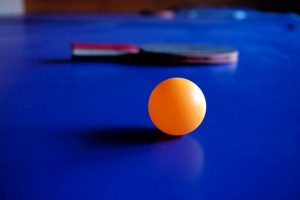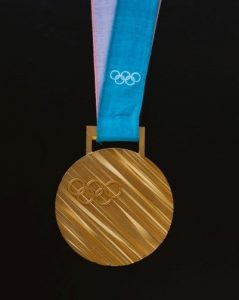
During the spring of 1971, 19-year-old American table tennis player, Glenn Cowan, wrapped up his training session in Nagoya (Japan) in order to prepare for the 31st World Table Tennis Championship about to take place later that week. He had been concentrating on perfecting his game for hours before he left the building. To his great surprise, Cowan encountered an almost empty parking lot. His team bus had left without him. But when the Chinese players, who were about to leave as well, saw a young American who looked lost, they motioned to him to hop on their team bus. During the short bus ride, Glenn was approached by the Chinese star player Zhuang Zedong. Against instructions to not seek contact with the American players, Zhuang introduced himself to Cowan and presented him with a gift – a silk-screen portrait of a Chinese mountain range. The next day, this friendly gesture was repaid in kind when Glenn gave Zhuang one of his personal t‑shirts which had a peace symbol and the Beatles’ lyrics for “Let It Be” on it. These small, spontaneous acts of human kindness triggered a series of events with great political consequences.
The early 1970s saw the restoration of the Sino-American relations and marked the start of the so-called Ping-Pong diplomacy. Prior to that, for almost two decades, the People’s Republic of China and the United States had no official diplomatic or economic relations whatsoever. After the newly founded Chinese Republic had intervened in the Korean War (1950–54), the relationship between the two countries had come to an all-time low. However, “times were a changin’.” The once strong alliance between China and the USSR was crumbling. At the same time, due to the long, bloody conflict in Vietnam, the United States definitely needed some diplomatic success in Asia. As a result of the changing circumstances, both Chairman Mao and President Nixon had unofficially shown the intention to improve the troubled relationship. The only question was: How? So when the news about the spontaneous interaction between two athletes spread, both China and the U.S. immediately seized the opportunity. Mao invited the American table tennis team to visit China once the World Championships were concluded – an invitation the Americans gladly accepted.
The table tennis team was met with highest regards, and even Chinese Premier Zhou Enlai granted them an audience. As the first American delegation to set foot on Chinese soil in over 20 years, the team members felt like diplomats rather than athletes. Western news media accompanied the team and used the opportunity to report about what was going on behind the Bamboo Curtain. The visit turned out to be a huge success. Time Magazine described the journey as “the ping heard round the world.” A year later, President Nixon invited the Chinese table tennis team to go on a tour throughout the United States. Due to the personal and political success of both trips, new back channel communication lines were established between the two governments which proved to be very effective in strengthening Sino-American relations. These relations would then pave the way for the historic Nixon visit to Beijing in 1972. “The little ball moved the big ball,” Chairman Mao would later say.

In a few weeks, the world again will see how sports events can – at times – offer an opportunity for political relations to improve: The Winter Olympics in Pyeongchang (South Korea) are being used to revitalize the rusty diplomatic relations between the two Koreas. During the past months, tensions between North and South Korea have come to a boiling point over North Korea’s nuclear program. Now the upcoming Winter Olympics brought the two countries back to the negotiation table for the first time in years. The two Koreas also reached other important diplomatic breakthroughs, such as the re-establishment of a military hotline, which hadn’t been in operation since the beginning of 2016.
Could this be the start of something called ‘the ice-skating diplomacy?’
21,065 Total Views, 7 Views Today






